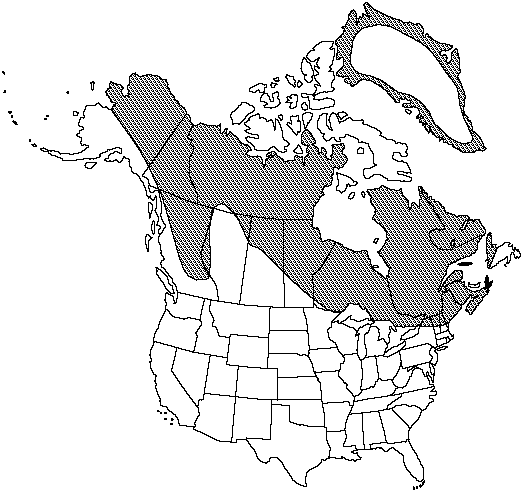Woodsia glabella
in Franklin,Narr. Journey Polar Sea 754. 1823.
Stems compact, erect to ascending, with cluster of persistent petiole bases of ± equal length; scales uniformly brown, lanceolate. Leaves 3.5–15 × 0.5–1.2 cm. Petiole green or straw-colored throughout, articulate above base at swollen node, somewhat pliable and resistant to shattering. Blade linear to linear-lanceolate, pinnate-pinnatifid proximally, glabrous or with occasional sessile glands, never viscid; rachis glabrous. Proximal pinnae fan-shaped, wider than long; distal pinnae ovatelanceolate, longer than wide, abruptly tapered to a rounded or broadly acute apex; largest pinnae with 1–3 pairs of pinnules, abaxial and adaxial surfaces glabrous. Pinnules entire or broadly crenate; margins nonlustrous, thin, lacking cilia or translucent projections. Vein tips slightly (if at all) enlarged, barely visible adaxially. Indusia of narrow hairlike segments, these uniseriate throughout, composed of cells many times longer than wide, usually surpassing mature sporangia. Spores averaging 39–45 µm. 2n = 78.
Phenology: Sporulating summer–early fall.
Habitat: Shaded cracks and ledges on cliffs, mostly calcareous rocks, especially limestone
Elevation: 0–1500 m
Distribution

Greenland, Alta., B.C., Man., N.B., Nfld. and Labr. (Nfld.), N.W.T., N.S., Ont., Que., Sask., Yukon, Alaska, Maine, Minn., N.H., N.Y., Vt., n Eurasia
Discussion
Woodsia glabella is a well-marked species occasionally confused with narrow, glabrescent forms of W. alpina and W. oregana subsp. oregana. These taxa are readily distinguished from W. glabella by their petioles, which are reddish brown or dark purple near the base.
Selected References
None.
Lower Taxa
"/5lengthofblade" is not declared as a valid unit of measurement for this property.